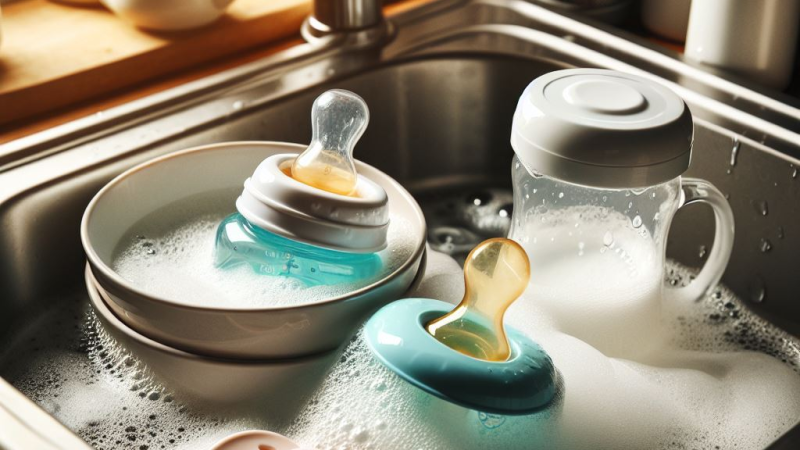
Guide: How to Clean Your Baby’s Dishware Safely and Effectively
Properly cleaning your baby’s dishware is crucial to prevent harmful bacteria and germs that could affect your little one’s health. From bottles to plates and utensils, it’s essential to make sure everything that comes into contact with your baby’s mouth is thoroughly sanitized. Here’s a comprehensive guide on how to clean baby dishware safely and effectively.
Why It’s Important to Clean Your Baby’s Dishware Properly
Baby dishware is constantly exposed to food, saliva, and often used in environments where germs can spread rapidly. Improper cleaning can lead to stomach infections and other health issues. Keeping your baby’s dishware free from bacteria is essential not only for their health but also for their comfort and well-being.
Steps to Clean Baby Dishware
1. Clean Immediately After Each Use
It’s crucial to clean your baby’s dishware immediately after each use. Leftover milk, purees, or food can dry quickly, making them harder to clean later. If you can’t wash them right away, rinse the utensils with cold water to prevent residue from sticking and becoming difficult to remove later.
2. Disassemble the Bottle Components
Bottles have several pieces that need to be cleaned separately: the bottle itself, the nipple, the cap, and sometimes the valve. Make sure to take apart all the components before cleaning them.
3. Use a Gentle, Non-Toxic Soap
Choose a gentle, preferably eco-friendly or baby-specific soap for cleaning. It’s important that the soap isn’t harsh or contains toxic chemicals that might remain on the dishware.
4. Use a Bottle Brush
For cleaning bottles and other utensils with narrow parts, like training cups or spoons, a bottle brush is essential. These brushes are designed to reach all areas of the bottle and effectively remove milk or juice residue.
5. Rinse Thoroughly with Water
It’s crucial to ensure there are no soap residues left on the dishware. Rinse each piece under running water until no detergent remains. Make sure everything is completely clean before drying or storing.
6. Sterilize Baby Dishware
Sterilizing your baby’s dishware is a key step in ensuring deep cleanliness. There are several ways to sterilize bottles and utensils:
- Boiling Water: Place the utensils in boiling water for 5-10 minutes.
- Sterilizing Case: Use an electric or microwave sterilizer to kill bacteria and germs.
- Sterilizing Tablets: Dissolve sterilizing tablets in water and immerse the dishware.
7. Proper Drying
Once the dishware is cleaned and sterilized, it’s important to dry it properly. Use a clean, dry cloth or a dish rack to air dry bottles and utensils. Avoid using towels that may be contaminated with germs.
8. Proper Storage
Store your baby’s dishware in a clean, dry place, preferably in a closed cupboard or container that protects it from dust and bacteria. Make sure everything is completely dry before storing, as moisture can promote mold or bacteria growth.
Essential Products for Cleaning Baby Dishware
- Bottle Brush: Specifically designed for cleaning the narrow parts of bottles.
- Gentle Soap: A soap free from harsh chemicals, ideal for cleaning baby dishware.
- Sterilizer: Whether electric, microwave, or tablet-based, a sterilizer is essential for deep cleaning.
- Dish Rack: To allow bottles and utensils to air dry in a clean place.
- Clean Towels or Cloths: For hygienic drying of dishware.
Additional Tips for Cleaning Baby Dishware
- Regularly Replace Nipples: Bottles' nipples can wear out over time, making them more prone to bacteria buildup. Replace them regularly.
- Avoid Harsh Cleaning Products: Do not use bleach or chlorine-based cleaners, as they can be harmful to your baby’s health.
- Consistent Hygiene: Wash your hands before and after cleaning baby dishware to prevent cross-contamination.
Frequently Asked Questions (FAQ)
1. How Often Should I Sterilize Baby Bottles?
It’s recommended to sterilize baby bottles at least once a day, especially during the first few months of your baby’s life. If your baby is sick or exposed to germs, increase the frequency.
2. Can I Clean Baby Dishware in the Dishwasher?
Yes, many baby bottles and utensils are dishwasher-safe. Make sure to place them on the top rack and follow the manufacturer’s instructions.
3. Is Using a Sterilizer Necessary?
It’s not strictly necessary, but using a sterilizer is highly recommended to ensure that no bacteria remain in the bottles and utensils.
Conclusion
Cleaning your baby’s dishware is crucial for their health and well-being. By following these steps, you can keep bottles, plates, and utensils perfectly clean and safe for your little one. Be sure to use the right products and sterilize dishware regularly to eliminate any bacteria or germs. Good hygiene is the foundation for your baby’s care.


